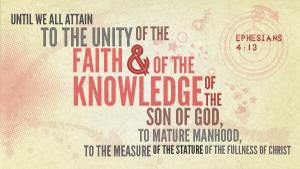 |
| source: biblia.com |
How do you know if you are growing in Christ? Our unity with other believers is perhaps the most important way to measure spiritual maturity.
It's too common for us in the American church
— in our individualistic culture
— to focus exclusively on our personal relationship with Jesus. We forget or overlook that almost all of the New Testament's teaching about faith is in terms of community of other believers.
The
biblia.com verse of the day reminded me this morning of one of my favorite passages in the Bible:
until we all attain to the unity of the faith and of the knowledge of the Son of God, to mature manhood, to the measure of the stature of the fullness of Christ
Ephesians 4:13 (ESV)
This is by no means the only place the NT teaches the importance of relationships in the Church, but the emphasis here is especially easy to see.
The purpose is to reach maturity... the "fullness of Christ."
But
how do I do that?
On my own?
Spending more time with Jesus?
Well, no. At least, that's not all. Don't get me wrong; the Greatest Commandment
is to "love the Lord your God with all your heart and with all your soul and with all your mind." (Matt 22:37) But that's not enough. There is a reason that the second is "love your neighbor as yourself:" You can't have one without the other.
Let's look at the rest of the passage:
1 I therefore, a prisoner for the Lord, urge you to walk in a manner worthy of the calling to which you have been called, 2 with all humility and gentleness, with patience, bearing with one another in love, 3 eager to maintain the unity of the Spirit in the bond of peace.
4There is
one body and
one Spirit
— just as you were called to the
one hope that belongs to your call —
5one Lord,
one faith,
one baptism,
6one God and Father of all,
who is over all and through all and in all.
7 But grace was given to each one of us according to the measure of Christ’s gift. ... 11 And he gave the apostles, the prophets, the evangelists, the shepherds and teachers, 12 to equip the saints for the work of ministry, for building up the body of Christ, 13 until we all attain to the unity of the faith and of the knowledge of the Son of God, to mature manhood, to the measure of the stature of the fullness of Christ, 14 so that we may no longer be children, tossed to and fro by the waves and carried about by every wind of doctrine, by human cunning, by craftiness in deceitful schemes. 15 Rather, speaking the truth in love, we are to grow up in every way into him who is the head, into Christ, 16 from whom the whole body, joined and held together by every joint with which it is equipped, when each part is working properly, makes the body grow so that it builds itself up in love.
Ephesians 4:1–16 (ESV)
Apart from the fact that the whole picture of "Body" is one of togetherness, notice how many "unity" words there are here: "with one another... unity... bond... one, one, one... building up... unity..." Wow, do you think there's a message here? The author even says
how to have unity with others:
verses 2 and 3.
If you want community with people, you must have humility, patience, and love... which come from Christ.
If you want to grow up in Christ, you also have to grow together with his followers.




